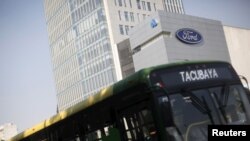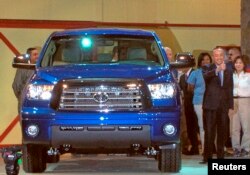The politics of trade took center stage again this week after the Ford Motor Company announced it would soon open a small car assembly plant in San Luis Potosi, Mexico, that will employ 2,800 people by the year 2020. Republican presidential candidate Donald Trump immediately blasted the automobile manufacturer for sending U.S. jobs out of the country, calling it a “disgrace.”
This is not a new issue for Trump. In fact, he targeted Ford’s Mexico plants when he announced his candidacy in June of last year, saying that, as president, he would tell Ford that he was rescinding the tariff-free imports established by the North American Free Trade Agreement (NAFTA).
“Every car and every truck and every part manufactured in this plant that comes across the border, we are going to charge you a 35 percent tax,” Trump said.
He did not explain how this could be done, since the president does not have the authority to impose a tariff in violation of a trade deal negotiated with other countries, approved by Congress and signed by a previous president. But his supporters cheered this statement, along with his promise to create more jobs.
On the Democratic side, Vermont Senator Bernie Sanders has used free-trade pacts against his rival, former Secretary of State Hillary Clinton, whose husband, former President Bill Clinton, signed the NAFTA agreement. Sanders has said that if he is elected president, he will renegotiate NAFTA and other trade agreements.
“We have got to lift up the standard of living of workers in this country and throughout the world,” he said. “Trade is a good thing, but it has got to be based on fair principles."
For her part, Clinton has backed off from her support for President Barack Obama’s Pacific trade deal, which she endorsed when she was secretary of state.
Political advantages
Political analyst Mark Jones at Rice University in Houston said anti-free-trade rhetoric resonates with displaced workers, the unemployed and workers who worry about losing their jobs.
“Sanders and Trump are taking advantage of the vision held by a significant number of Americans that, while free trade may be good for the overall economy, it is not good for their individual situation,” he said.
Part of the problem, Jones said, is that the 5 million jobs economists say were created by NAFTA are not visibly connected to free trade, even by many people holding those jobs.
“It is very easy to find individuals who have lost their jobs to free trade, but it is difficult and nebulous to find people whose jobs have been created by free trade,” he said.
San Antonio’s experience
One person who does see how free trade benefits the country is Tom Long, executive vice president of the San Antonio Economic Development Foundation.
“We are living and working in a global economy,” he noted, “so free trade, in my opinion, makes that global system of commerce more efficient and more effective.”
San Antonio has benefited directly from NAFTA by being the closest large city to the major border crossing to Mexico at Laredo. Trucks travel up Interstate Highway 35 to terminals and warehouses in San Antonio. The interstate, which has been dubbed the “NAFTA highway," also passes through the Texas state capital, Austin, and the Dallas-Fort Worth metropolitan area.
San Antonio has long-standing economic and cultural ties to Mexico, which have been strengthened by NAFTA, according to Long. But he said the city’s receptiveness to international trade has helped it gain manufacturing plants from Asian nations.
“Companies are looking at San Antonio to serve a North American market because they have realized from a manufacturing standpoint that it is more efficient and effective to manufacture certain products here than it would be in the Far East,” he said.
Long provided the example of Toyota, which has a plant making trucks in San Antonio that directly and indirectly adds thousands of jobs to the area economy. Cities like Houston and Dallas also benefit by having many foreign companies open their U.S. headquarters offices in those cities.
Other cities and states around the country have also benefited from the global economy. But because the direct impact on people’s lives is not always easy to see, some politicians tend to focus on the negative aspects of free trade, rather than the positive.






